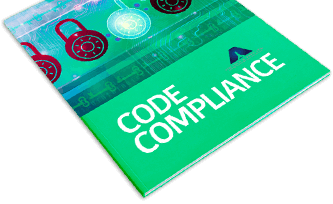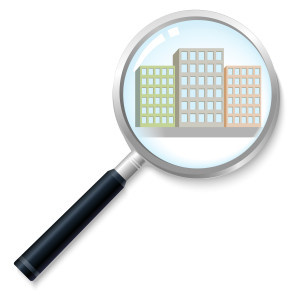 Apartment renters have different security concerns vs. homeowners, like:
Apartment renters have different security concerns vs. homeowners, like:
- Lack of privacy due to living in close proximity to other tenants
- High volume of foot traffic in your apartment complex
- Multiple entry and exit points in the building
- Potential roof access
Of course, this doesn’t mean that apartment security is any less important than home security. No matter where you live, home should be the safest place you know.
However, living in an apartment building may put your particular unit at an increased risk of intrusion, burglary and theft.
So if you’re moving into an apartment for the first time – or if you’re looking to improve the overall safety of your apartment – here are some easy-to-follow tips you should use.
Before you move in
As you investigate various apartments – and before you sign you tenancy agreement – make certain you research the following things:
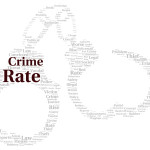
Look at the crime statistics of the area
Your dream apartment can turn into a nightmare quickly if it’s surrounded by criminal activity.
To find out the local crime rates, you can:
- Talk to the police
- Speak with your potential landlord
- Ask other tenants about the past break-ins
- Visit your local police department’s website to view crime statistics
Check out the lighting
Bad guys usually prefer to work in the dark or poorly-lit areas.
So before you select an apartment, discover which areas you’ll be accessing (like parking lots, stairways or hallways) on a regular basis and determine – for yourself – if you think they have adequate light to make you feel safe.
See how well the building is maintained
Is the building in pristine condition? Are the walls nicely painted, or are they peeling and cracked?
Is the lawn well-manicured, or is it overgrown and full of weeds?
What does nice grass have to do with safety?
Not much. Except that if the landlord can’t be bothered to keep the building looking its best, then he or she may not be too concerned or interested to keep it safe and secure, either.
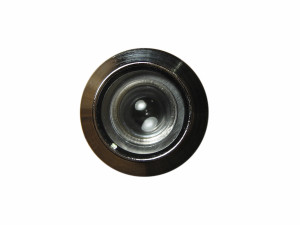
Test the peephole
If your potential apartment door has a peephole, test it out to make sure it actually works and you can see who’s at the door before you open it.
No peephole?
Ask the landlord about having one installed prior to moving in.
Examine how you enter and exit the building
In order for people to get into the building, is the access control mechanism a:
And – more importantly – are they in good working order? Does the lock on the outside entry door appear broken, or is it secure?
Can you access the security camera from your apartment? Or is it a dead signal or black screen that doesn’t show you who’s there?
When living in an apartment, it’s important for residents to be able to control who gets in – thus preventing access to such undesirables as loiterers, salespeople or unsavoury characters.
After you move in
Once you’ve found your perfect apartment, keep it, your family and your valuables safe by doing the following:
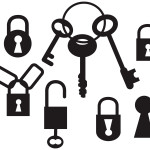
Changing locks
This is obvious, but some new apartment dwellers overlook this simple – but important – step.
Some landlords say they’ve replaced the locks, but sometimes what happens is that locks just get rotated between apartments in the building.
Other times, extra keys from the previous tenant get lost or aren’t returned to the building manager.
It’s also important to note that in most apartment complexes, tenants aren’t generally allowed to change locks themselves.
That’s because apartment locks need to be master keyed so that the landlord or superintendent has access to the unit in case of an emergency.
If you haven’t already, ask your landlord about having old locks replaced with brand new locks and not redistributed old ones.
Because you never know who still has an old key to your new apartment.
Secure the sliding doors
If you live on an upper level apartment, balcony doors are wonderful for letting in natural light and watching the city.
But they’re also a safety hazard for children – and a potential entry point for burglars – if they aren’t properly secured.
In order to make certain your balcony doors are safe, you should do the following:
- Test to see how easily they come off their tracks
- Install an inside bar or pole for extra security
- Install a secondary locking mechanism (in addition to the one already included on the door) that prevents unwanted openings
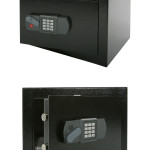
Get a safe
A strong safe can be the last (and toughest) line of defense to protect your most valuable and irreplaceable items, such as:
- Jewelry
- Cash
- Firearms & guns
- Important documents
- Keepsakes and mementoes
If you do invest in a safe, talk to your landlord about bolting it to a floor or wall, so a burglar can’t pick it up and take it with them.
Should you be allowed to bolt your safe down, you should then contact an experienced locksmith who can help you secure it without compromising its integrity or ability to keep your stuff safe.
Invest in renters insurance
Renters insurance will protect the value of your possessions should they be stolen or destroyed in a disaster (like a fire or flood).
Your landlord may have an insurance policy already, but it may only cover the building itself and not your personal belongings.
Buy good blinds
Not only will they look nice, high-quality blinds will prevent robbers from looking inside your apartment and seeing all your valuables or possessions.
A tip to remember is that, whenever you leave your apartment, always make sure to close your blinds.
Before you move in, after or anytime – contact us for your security needs
Something that works for a house may not work for an apartment when it comes to safety and security.
If you’re living in an apartment – or planning on moving into one – and want to make certain it’s as safe as possible, contact us so we can help you out.






